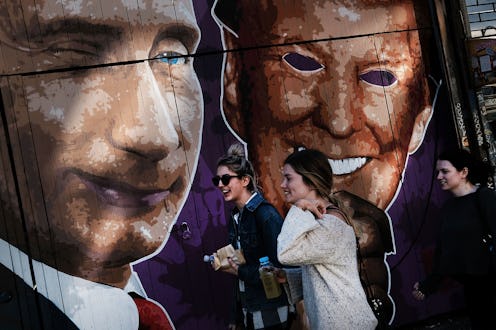News
I'm A Russian Immigrant & Here's What The Trump/Russia Scandal Means To Me

The level of anti-Russian hysteria is riding high, and it’s not just on CNN and Capitol Hill, but in my blood every time my Russian-Jewish immigrant father utters the word “Trump.” I freeze up when I hear his name in the car on the way to pick up my daughter and I shake at the dinner table when Kremlin-sponsored news booms across the salt and pepper. Instead of reading Dostoevsky or watching Eisenstein, my Russian-American family friends swear by Clinton Cash, a book and movie that “exposes” Bill and Hillary's corrupt business dealings. Clinton Cash has caused a lot of damage, not the least of which was its role in Hillary Clinton's 2016 loss.
Russian Americans, many of whom are Jewish, owe a big debt to the Democrats, which is why I find my father’s fervor for Trump so confusing. Democrats are the party historically responsible for bringing my family (and so many like it) into the U.S. through the Jackson-Vanik Amendment of 1974. While many Russian immigrants have made good on the American dream, working on Wall Street or in one of the cliched American Jewish professions — law or medicine — many Russian immigrants in Brooklyn still rely on the social safety net: welfare, Medicaid, Medicare, and low-income housing — the totems of the Democratic Party. After several of my family members voted for Trump, I created a list of all of the social programs created and upheld by the Democrats since FDR and LBJ, and put it up on my refrigerator. I am not aware of even one Russian immigrant who has not directly or indirectly benefitted from at least one of these programs.
After several of my family members voted for Trump, I created a list of all of the social programs created and upheld by the Democrats since FDR and LBJ, and put it up on my refrigerator.
As a Russian immigrant who has lived in the U.S. for close to three decades, I find the possibility that Russia helped sway the election toward Trump particularly scary. But I am in the minority of my fellow Russian refugees. The majority of Russian immigrants to the U.S. are Republican-leaning. According to U.S. News and World Report, 70 to 75 per cent of Russian and Ukrainian immigrants voted for Republican candidates in the 2008 and 2012 presidential elections. It’s not just my dad or uncle or some cousin who voted for Trump. One of the reasons my father supported Trump in the days leading up to the election — the one that I found hardest to take — was that Trump would restore a strong relationship with Russia while Clinton would unleash a nuclear war.
They aren’t fans of Putin, but they do not believe reports from U.S. intelligence services that the Kremlin directly ordered the cyberattacks on the DNC. They believe that this is just Democratic propaganda orchestrated by President Obama in retaliation for Russia's annexation of Crimea and aggression in eastern Ukraine. The Russians who voted for Trump that I know can typically be divided into two camps: those who were fed up with 70 years of Communism and embraced full-fledged capitalism, the embodiment of which is the Republican Party; and some Russian-American outliers who were bothered by Obama's and Clinton's anti-Russian stance. They wanted a regime which would be pro-appeasement with Putin.
My father and I have sworn of all forms of political discussion as every argument ends in raised voices and usually tears (on my end).
The ideological divide between the pro-Trump Russians and myself — and the rest of the Russian-Americans who voted for Hillary Clinton— isn’t softening. Disputes over the Trump, Putin, and election-meddling has not only led to a massive wave of Facebook "unfriending" among Russian-Americans, but it’s fractured friendships and families. My father and I have sworn off all forms of political discussion as every argument ends in raised voices and usually tears (on my end).
For those of us who are anti-Trump, we hope that some form of collusion with Russia will ultimately prove his downfall. Yet, some of us have relatives in Russia, and we fear more stringent sanctions from Congress will cause the Russian economy to plummet even lower. As I write this article I'm sitting in the kitchen of my rented Saint Petersburg apartment. I'm here to visit relatives and show off my two kids. There are almost no European products in the grocery stores: Gouda, Manchego, and Camembert can't be found because of sanctions. Meanwhile, the Russian ruble has fallen to half of its value since the last time I was here in 2010 (as a result of both sanctions and low oil prices.) Middle-income Russians are finding it difficult to travel as it's hard to afford Europe with their worthless currency.
On the one hand Russia deserves sanctions — it should learn not to interfere in foreign elections. On the other hand, who is the U.S. to say it has the moral high ground? Our history of CIA-backed coups, attempted assassinations of political leaders, successful efforts to help eliminate political enemies like Che Guevara, and most recent foray into torture have taken the moral high ground away. Of course, I have to point out that a certain president made a similar argument shortly after being elected: “You think our country’s so innocent?” President Trump told Bill O’Reilly when pressed about Putin’s “killer” ways. When it comes to politics these days, I may not agree with my family or the immigrant community, but even I would have to admit that may be the most truthful thing Trump has ever uttered.